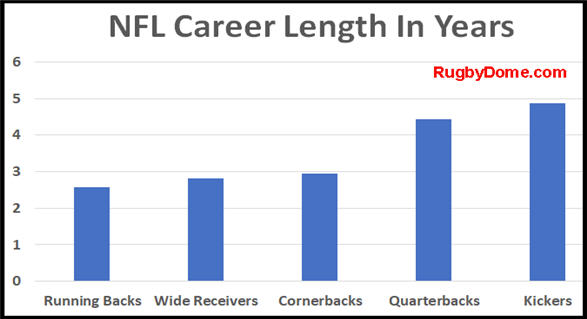NFL player careers last on average from 3 to 3 ½ years.
This article looks in depth at why NFL careers are so short. It’s not just the physical toll of a collision sport. There are other factors, including economic and psychological reasons.
How Long Is The Average NFL Player’s Career?
These are the latest statistics of career length by position in the NFL:
| Player Position | Career Length In Years |
| Running Backs | 2.57 |
| Wide Receivers | 2.81 |
| Cornerbacks | 2.94 |
| Quarterbacks | 4.44 |
| Kickers | 4.87 |
You can see that the range is from 2 ½ to just short of five years. But what is the average across all positions?
The average career in pro football is 3 ½ years across the different positions.
Kickers and quarterbacks have the longest careers that last on average between four and five years.
Running backs have the shortest careers. They last at just over 2 ½ years.

Of course, there are different ways of considering averages. We’ve done it by position.
But there are more wide receivers and running backs on a player roster than there are quarterbacks and kickers. If you’re wondering, there are a combined ten WRs and RBs on a typical roster versus two QBs and two kickers.
So, this is going to skew our calculated averages in favor of a slightly longer career. That is a little misleading.
It’s fairer to say that the average is from 3 to 3 ½ years, as we stated in the introduction.
Arguments from the NFL Commissioner
These numbers aren’t a good look for the sport. And there’s been occasional pushback from the top of the NFL to dispute them.
One Commissioner attacked the “myth” of these low numbers and claimed that the average was more like six or seven years.
Critics were quick to point out that Commissioner Roger Goodell was ridiculously selective in how he presented his figures.
For example, the figure of six years only included players who made an opening day roster in their rookie season!
The figure of seven years was based on an even more convoluted restriction. Players had to be rostered for three games over three seasons to make it into the Commissioner’s calculations.
We could tie ourselves into similar knots to produce equally ridiculous low figures. How about only including players who were injured out of the sport in their rookie season?
Now the average is below a year! Nobody would accept that as reasonable.
The lesson here is to take anything coming from the head honchos with a bucket of salt.
Why Do NFL Players Have Short Careers?

Why are NFL careers so short? Here is a brief summary of the reasons.
- Physical toll
- Two-platoon system
- Injury Treatment
- Competition for places
- Economic pressures
- Psychological and social factors
The physical toll is the obvious reason but not the only reason. If the physical toll was all there was to it, kickers would have longer careers!
Still, football is a sport of violent collisions on every single play.
The stop and start nature of football is also a physical factor in that it allows for a rest between every play. This means that on each play, every player can deliver maximal effort and maximum punishment.
There is no question that this affects the body after a while. But there are other reasons for such short careers. Let’s go into more depth on each one.
Two-Platoon System
The two-platoon system is the current rule set that allows separate players for offense, defense, and special teams.
You may be surprised to learn that substitutions and the two-platoon system didn’t exist before the Second World War. If you want to know more about the history, check out our article about special teams.
We’ll mention here that the system doesn’t just allow for more rest. It also allows more extreme body types to play the game.
There is no way the blazing fast, 300+ pound behemoths on the lines would be able to play if they had to play the entire game.
Because the rules allow it, these athletes have sacrificed endurance for maximum speed and power.
In single-platoon football, it was a common joke that all football players looked exactly alike. Everyone was between five feet eleven and six foot two. Everyone weighed between two hundred and two hundred and forty pounds.
The game was collisions between physical equals because everyone had to do several jobs and needed to be able to go for a full sixty minutes.
Now it’s a game where there are collisions between specialists with wildly different body types. This takes a greater toll on bodies.
Injury Treatment

The NFL season only lasts a few months, so the pressure to get back on the field is high. It’s not just the team medics under pressure from the coaches to patch up players fast.
The players themselves want to get back playing as soon as possible. This is especially true for the journeyman player who is looking over his shoulder at his backup.
The last thing he wants to do is let the backup, who is costing the team less money than he is, have more time on the field to prove himself.
How does this compare to rugby?
Let’s contrast this with professional rugby. Major League Rugby in the U.S. is an anomaly in the world rugby calendar in that it only lasts six months. But that is still a little longer than the NFL.
However, the elite professional tournaments in Europe last for eight to nine months. Professional rugby players are given more time to recover from an injury than an NFL player.
It’s worth giving rugby players rest time for an extra two weeks if you get an extra two months of playing time through a long season.
Competition For Places
The NFL has very few positions for players and there is heavy competition for those positions.
Each team is allowed to have only fifty-three players and is allowed to dress only forty-six on game day.
There are only thirty-two teams and there are no real professional minor leagues.
Every player who enters the NFL has been playing a collision sport for at least 3 years. Most played football in high school, so this means more than 10 years within a collision sport.
The older you get, the more accumulated damage you have. So it gets harder and harder for a veteran player to be as fast and agile as the younger guys.
And there are always more young guys, every year, year after year. Hundreds of quality players are graduating from college and either entering the draft or being signed as undrafted free agents every single year.
Economic Factors

Aside from the few marquee stars, NFL teams are always looking for younger and cheaper players. There are a few reasons for this.
Salary Cap
The NFL salary cap only allows every team to pay a certain amount in salary every year.
The result of this is that teams can’t build up a big roster of stars as they did in the pre-salary cap era. They have to pick the few stars they are going to hang onto, and fill up the rest of the roster with a constantly revolving cast of new, younger players.
That means older journeymen are put out the door to make way for the new influx.
The New England Patriots have been the absolute masters of this during the salary cap era. While they won Super Bowl after Super Bowl, the only real constant on the field was Tom Brady.
Even then, Brady took a voluntary pay cut to allow the team to hold on to more high-quality players.
Wage Scale
Under the NFL collective bargaining agreement, rookie salaries are cheap. Then, each year in the league a player moves to a higher pay scale.
Because of this, the teams have a big incentive to favor younger players.
A journeyman player has to be significantly better than the rookie who is trying to take his job because the rookie is better for the salary cap.
This is why many perfectly competent players find themselves out of the league after only a few years.
As the team sees it, if they can replace the veteran journeymen with rookies, maybe they can afford to keep a few more stars!
Psychological Factors
The main psychological factors are burnout and distractions. Let’s look at each in turn.
Mental burnout

It’s hard for players to keep up the level of effort that’s required to stay in the league. The endless rounds of workouts, training camps, and the non-stop grind of staying in absolute top condition while banged up and in pain take a mental toll.
Combine this with the constant competition against younger players coming to take their position and there is an incredibly high level of mental stress.
Most NFL players come from Division One colleges and from top football high schools before that. Even at a young age, the grind was just as intense.
Because of this, many of these players have been living in a mental pressure cooker for ten years before they even hit the NFL. It is not surprising that many crack or slip.
Even the slightest stress or fatigue-related slippage in training can result in a player losing the edge he needs and being out of the league.
Stars can slip up and be given time to get their heads together; the average player won’t get that consideration.
Distractions
NFL players make good money! It can be a massive change in a young man’s life, especially for those who come from disadvantaged backgrounds.
Understandably, many have no idea of how to handle money or fame.
This comes with all the usual problems. Some players can get so caught up in enjoying the benefits and fun of money and fame that they let their training or focus slip.
This can have fatal results for their career. The next hungry young newcomer wants to eat their lunch!